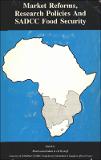| dc.description.abstract | The decision to launch the Southern African Development Coordination Conference (SADCC) on April, 1980 was made by Heads of States in Southern Africa. These, at the time included Angola, Botswana, Lesotho, Malawi, Mozambique, Swaziland, Tanzania, Zambia and Zimbabwe. Namibia, which gained independence on March 21,1990, joined SADCC on April 1,1990 — the day the organisation was celebrating its tenth Anniversary. Before 1980, the SADCC member states had been assisting each other in fighting for political independence. In the declaration, "Southern Africa: Toward Economic Liberation", these states declared their commitment to pursue policies aimed at economic liberation and the integrated development of their national economies. They identified areas in which, working in harmony, they could guide national development toward providing goods and services presently obtained from outside the region and thus weave a fabric of self-sufficiency through regional cooperation. The identified areas were the productive sectors of food, agriculture and natural resources; energy, industry and trade; mining and tourism. They also identified the key service sectors, human resource development and transport and communication. The main objective was to improve the welfare of member state citizens through creation of jobs, services, improved food security and allowing them to participate in intra-regional trade. | en |


